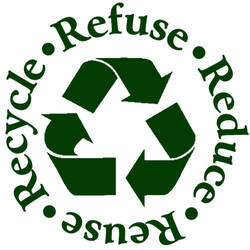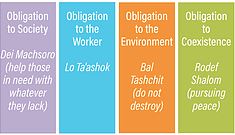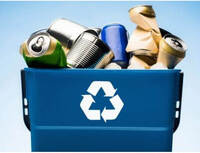Conservation
 Reduce, Reuse, Refuse, Recycle: Join Mosaic's "Green Team!"
Reduce, Reuse, Refuse, Recycle: Join Mosaic's "Green Team!"
Preserving nature goes hand in hand with appreciating and enjoying the great outdoors. Don't you agree? So
why not become part of a community that shares these values? Join Mosaic's International Green Team, a
group of like-minded individuals with the goal of 'greening' the North American Jewish Outdoor Escape.
Together, we'll plant the seeds of a shared ethic of conservation and environmental awareness that can be
carried back home. We need your good energy and ideas to make this year's event and all the future ones
more sustainable. For questions, to share ideas, brainstorm, and for more information, email us at conservation@mosaicoutdoor.org
The Environment and Jewish Values
It's essential to understand the Jewish case for caring for our planet. Here are some enlightening words
from various sources that can inspire us to be better stewards of our environment:
Remember whose Earth we are living on and what we are supposed to be doing with it:

- God placed the human in the Garden of Eden, l'ovdah (to serve/till) u'l'shomrah (and
guard/tend it). (Gen. 2:15)
- God led Adam around all the trees of the Garden of Eden. And God said to Adam: See My works, how good and
praiseworthy they are? And all that I have created, I made for you. But be mindful then that you do not spoil
and destroy My world, for if you spoil it, there is no one after you to repair it. (Midrash Qohelet Rabbah
7:13; ca. 8th Century C.E.)
- The simplest image, and indeed the most sensible one, in thinking about our ecological responsibilities is
to see the earth as belonging to the source of being, and us as its trustees, charged with conserving and, if
possible, beautifying it for the sake of our grandchildren not yet born. (Chief Rabbi Jonathan Sacks (UK), The
Dignity of Difference)
On Waste
- Righteous people do not waste even a mustard seed in this world. They become sorrowful with every wasteful
and destructive act that they see, and if they can, they use all their strength to save everything possible
from destruction. But the wicked ...rejoice in the destruction of the world, just as they destroy themselves.
(Sefer HaChinuch 529; 13th Century)
- Regard all living things as G-d's property. Destroy none, abuse none, waste nothing, employ all things
wisely...look upon all creatures as servants in the household of creation. (Rabbi Samson Raphael Hirsch)
Respect all life
- It should not be believed that all beings exist for the sake of humanity's existence [instead,] all the
other beings, too, have been intended for their own sake (Rambam / Maimonides, Guide of the Perplexed III:13;
12th Century, Egypt)
- God did not permit Adam and his wife to kill a creature and to eat its flesh. Only every green herb shall
they all eat together. (Rashi, 1040-1105)
Back to the top of the page
Offset Your Carbon Emissions
We all emit carbon dioxide emissions when we drive, fly, use electricity, or generate waste. We all travel
varying distances to get to Mosaic events. Learn how many emissions you are producing and consider offsetting
those emissions.
Take a proactive step in reducing your carbon footprint. Calculate your emissions and consider buying offsets
to neutralize your impact on the environment.
What is carbon offsetting?
Carbon offsets are credits for reductions in greenhouse gas emissions made at other locations, such as wind
farms, which create renewable energy and reduce the need for fossil-fuel-powered energy.
For carbon offset to be credible, it must meet essential quality criteria, including proof that it is
additional (the reduction in emissions would not have occurred without the carbon finance), that it will be
retired from the carbon market so it cannot be double-counted, and that it addresses issues such as permanence
(it delivers the reductions it stated) and leakage (the emission reduction in one area doesn't cause an
increase in emissions somewhere else).
You can learn more at the David Suzuki Foundation and the National Resources Defense Council.
Back to the top of the page
Click here for Registration and Pricing